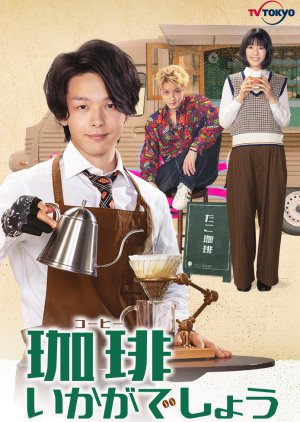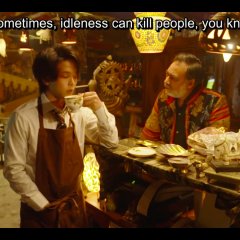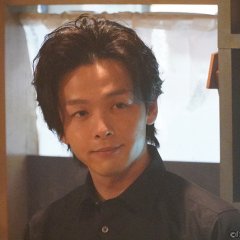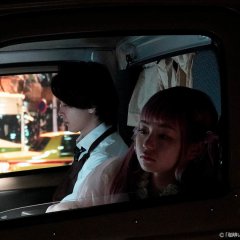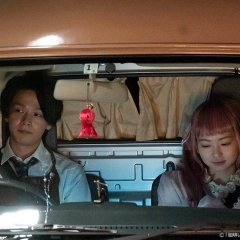- Português (Brasil)
- 한국어
- 中文(简体)
- 日本語
- Título original: 珈琲いかがでしょう
- Também conhecido como: How About Coffee , Coffee Ikaga Deshou , Coffee Ikagadesho , E o Café? , Que Tal Café? , How About Some Coffee? , How About Coffee? , Vai um Cafézinho?
- Diretor: Mori Yoshitaka
- Roteirista e Diretor: Ogigami Naoko
- Gêneros: Vida, Drama
Elenco e Créditos
- Nakamura TomoyaAoyama HajimePapel Principal
- Isomura Hayato"Pei"/Sugi SanpeiPapel Principal
- KahoShima KakinePapel Secundário
- Mitsuishi KenTako [Homeless man]Papel Secundário
- Adachi RikaBaba [Office lady] (Ep. 1)Convidado
- Kanjiya ShihoriHayano Misaki [Telephone operator] (Ep. 1)Convidado
Resenhas

A Tale Which Tries To Warm Your Soul…
‘ Coffee Ikaga Deshou’ ( alternatively translated as ‘ How About A Coffee?’) is one of those dramas which will likely remain under the radar for most drama watchers. Based upon the manga of the same name and Adapted to the small screen by screenwriter and director Ogigami Naoko alongside co-director Mori Yoshitaka, ‘ Coffee Ikaga Deshou’ ‘s plot isn’t complex.
Admittedly ‘ Coffee Ikaga Denshou’ isn’t an overly original concept. Main lead and arcane barista and coffee van owner Hajime Aoyama ( played brilliantly by Tomoya Nakamura) comes across in a similar suave and mysterious manner as the “ mysterious flaneur figure” Izakaya owner from ‘ Midnight Diner’.
However on a virtuous note Coffee Ikaga Denshou’ ‘s plot was fairly driven by its prominent messages during most of the series. From dealing with issues such as struggling to fit in the status quo, disillusionment, popularity and grief, most episodes had something fairly
poignant to address about Japanese society and everyday life.
Yet unlike the reoccurring characters of ‘ Midnight Diner’ who were left only to piece together parts of the owner’s past, Aoyama’s link to his backstory as well as his reasons for becoming a coffee connoisseur, played a more “ pivotal role” within the events of the series. The main driving force behind the " tension" of the plot evidently occurred within the interwoven backdrop of each episode focusing upon surrounding the reoccurring onscreen appearance of the mysterious gangster ( Isomura Hayato) who was hunting down Aoyama for unknown reasons .
There’s a lot to discuss about how the series dealt with Aoyama’s character arc. On a positive note playing upon the storyline of Aoyama’s " secrecy being hidden in plain sight" made him an enticing character to learn more about and when his past was revealed it did present a lot of surprising revelations about our main lead. However Aoyama’s transition between his past persona and his current-self rarely felt more subtle or blurred, whilst his journey and struggles to kick past habits ( unless it was necessary for " dramatic tension") often felt disengaged from the storyline.
Due to the change and swap-up of characters during episodes it’s hard to pick out a multitude of characters to analyse in more depth. However due to their reoccurring appearances it is important to discuss ( without spoilers) about how the series dealt with the mysterious gangster Pei and his character arc alongside Shima Kakine ( Kaho)-the first customer to be shown to be served by Aoyama onscreen- and our " final major antagonist”.
Speaking about the latter character Pei’s initial raison d’être is acting as an antagonistic force within the drama by hunting down Aoyama for unspecified goals. However whilst it was undeniably sweet to see Pei have his moment of redemption through his later actions and decisions, the build-up of Pei’s actual character redemption arc often felt sporadic. Of course whilst the drama did drop hints towards Pei’s own personal connections, this rarely felt more built up or more widely interwoven with with Aoyama’s own character arc also.
Then of course there’s Kakine. Kakine is an odd character to discuss as
after her initial appearance in the first episode, her character doesn’t appear again until the last few episodes when the final storyline kicks in. Whilst Kakine is undeniably kindhearted by acting as the stereotypical " moral cheerleader" figure during the later storyline, she’s a character who felt the most paradoxical due to how the series approached her character. To explain this further it is important to point out that Pei initially commented during one of his first interactions with Kakine that she was annoying as she was " boring and dull". However during the first episode one of her major problems throughout the storyline of this episode was her inability to truly fit in at work. It seems an evidently nuanced point and whilst it is correct to assume perhaps from Pei’s perspective, Kakine is boring as she isn’t cut from the same cloth, it seemed an odd point not to expand upon Kakine’s own feelings and thoughts after this initial interaction. Whilst it is evident that perhaps the series didn’t have enough time to focus upon Kakine’s expanded feelings during this episode, it felt a wasted opportunity not to have used more the to have explored Kakine’s feelings, her previous struggled as well as her desire to make a good cup of coffee after her initial meeting with Aoyama.
Last but not least is evidently our " major antagonist" of the series. Now without giving too much away about the plot, our antagonist has their own personal reasons for standing in Aoyama’s way as well as their own screen time to explore their moments of humanity also. On the other hand their character introduction and build-up felt rushed and lacklustre . Whilst it is understandable that the series wanted to keep us in the dark for as long as possible about their identity, it felt slightly odd that the series didn’t try to foreshadow their character introduction or at least their presence in the series as opposed to a quick " climatic turn of events". As a consequence whilst the first half of the series thrived with strong plot messages and mystery, the second- half( whilst presenting more revelations) did seem to struggle with conveying the same ambience of charisma and strong screenwriting .
So is ‘ Coffee Ikaga Denshou’ actually worth watching? Whilst the acting front is fairly decent ( sans from a few awkward line deliverances) and the drama offers an interesting array of characters, main lead Aoyama undeniably has his own peculiar charm over audiences to keep them watching. Each episode offers the formulaic tale of a new issue or message during the first-half of the series and a melodramatic plot climax and revelation during the final part. The end result of eight episodes stringing out a lacklustre climatic buildup will undeniably leave viewers with mixed feelings.
Esta resenha foi útil para você?

Pause café
J'aime le café ! Alors un drama adapté d'un manga sur ce thème principal ne pouvait que me faire titiller les narines. En rôle principal Nakamura Tomoya, au sourire ravageur et toujours aussi fin gourmet. On peut dire que les producteurs ont mis le paquet pour séduire la Working Girl trentenaire et célibataire. Et pour cause, tirée d'un Josei Manga, genre encore peu connu en France, cette histoire est destinée en particulier à la gent féminine urbaine de cette tranche d'âge, fortement célibataire et indépendante. Le premier épisode ne trompe pas. Nakamura Tomoya s'installe avec son minuscule Foodtruck sur le parvis des grands bureaux de Tokyo ou Yokohama accueillant à l'heure de la pause les offices lady au caractère les plus divers.Assez Cheap dans la production, on retrouve l'ambiance surannée de Gourmet détective et des clichés que les Japonais adorent tant envers la bouffe occidentale et tellement Rome -Antique. Ici, c'est le café, préparé avec lenteur et classe qui fera fantasmer les papilles du spectateur.
Chaque épisode est scindé en 2 histoires de 20 min accueillant de nouveaux protagonistes à chaque fois. Le fait d'être un ambulant favorisant ce scénario. En regardant le 1er épisode on peut donc imaginer vite se lasser de ce genre de non-événement. L'héroine, power-harassée par son patron, la trouvant désuète dans son travail de secrétaire, mais trouvant réconfort auprès de Nakamura, plus désuet que lui tu meurs. Mais plusieurs indices montrent que l'histoire peut prendre de la consistance rapidement. Même s'ils sont très mal distillé (un peu lourd, dirons-nous).
Beaucoup moins rose qu'il n'y paraît le monde de Nakamura devient bien sombre au fil des épisodes. Une véritable dark story nous faisant sortir totalement de la zone de confort ouateuse mise en place émerge au bout du 3e. Voilà pourquoi il ne faut pas se priver de gouter à ses délicieuses préparations sous prétexte d'un genre littéraire réservé aux secrétaires en mal d'évasion.
Un autre atout de la série, c'est son casting, qui ne met pas seulement en avant le plus beau sourire de la Tokyo TV, mais rassemble autour d'une bonne tasse de café la crème des acteurs de la télévision japonaise. J'en dévoile pas plus, mais quel bonheur de retrouver Adachi Rika ou Kanjiya Shihori rien que dans le premier épisode. Kaho par contre qui tient le rôle féminin phare manque un peu de prestance, mais elle peut encore prendre de la consistance au fil des épisodes. Une fois de plus la performance de Takito Kenichi vous enchantera ou vous agacera, à condition d'arriver à la reconnaître.
Voyager dans les rues de Tokyo grâce au van de notre Jacques Vabre est aussi un bonheur pour le petit français de province à qui marcher dans ses rues manque tellement. Une musique ultra répétitive de style reggae semble à tout moment vouloir rappelé d'où vient le café et pourra donc irriter. Mais elle ne vous sortira plus de ma tête au bout de deux épisodes, alors pourquoi bouder son plaisir.
Esta resenha foi útil para você?

